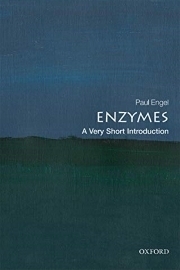Enzymes: A Very Short Introduction

Paul Engel
Oxford University Press, £8.99
Oxford’s popular series of Very Short Introductions can be seen in bookshops across the country and has tackled hundreds of topics from Abolitionism to Zionism. The task of introducing readers to ‘enzymes’ falls to Paul Engel, emeritus professor of biochemistry at University College Dublin. He begins by gently steering us away from the common idea that enzymes are simply chemicals that help digest food or break down stains in the washing machine. They are, of course, the drivers of all biological processes found in nature, ‘the orchestrators of life’.
The crash course in organic chemistry and the origins of biochemistry that follows may be a somewhat challenging start for the lay reader hoping for a simple introduction to this topic. However, it provides the foundational understanding required for the book to really begin, in chapter two: an introduction to the key catalytic function of enzymes called ‘Making things happen’.
Plenty of boxouts, case studies and diagrams help to enhance the most technical parts of the text, which covers everything from enzyme kinetics and structure to medically important enzymes and enzyme engineering, and of course highlights the work of Fred Sanger.
As with other Very Short Introductions I have read, it is always quite surprising how much information is packed into these books, which may be small in size, but are not actually that short (almost 150 pages of very small text, in all). The level of depth and difficulty of the text – which early on feels quite heavy going for a ‘way in to a topic’ – may be a fault of the series and how it is marketed, not the author. Engel’s Very Short Introduction is in fact a fairly comprehensive textbook that provides a decent technical grounding in enzymology and will no doubt teach many professional biologists a thing or two.
I did wonder if it might have been helpful to make the clarification right at the beginning of the book that enzymes are (almost always) proteins, but proteins are not always enzymes, to help ease readers into the complex protein chemistry to come. Aside from that, Enzymes manages to provide a broad yet detailed guide to the diverse, complex and fundamental chemical assistants that elevate chemistry into living, breathing, thinking life.
Nadia Abbott AMRSB


